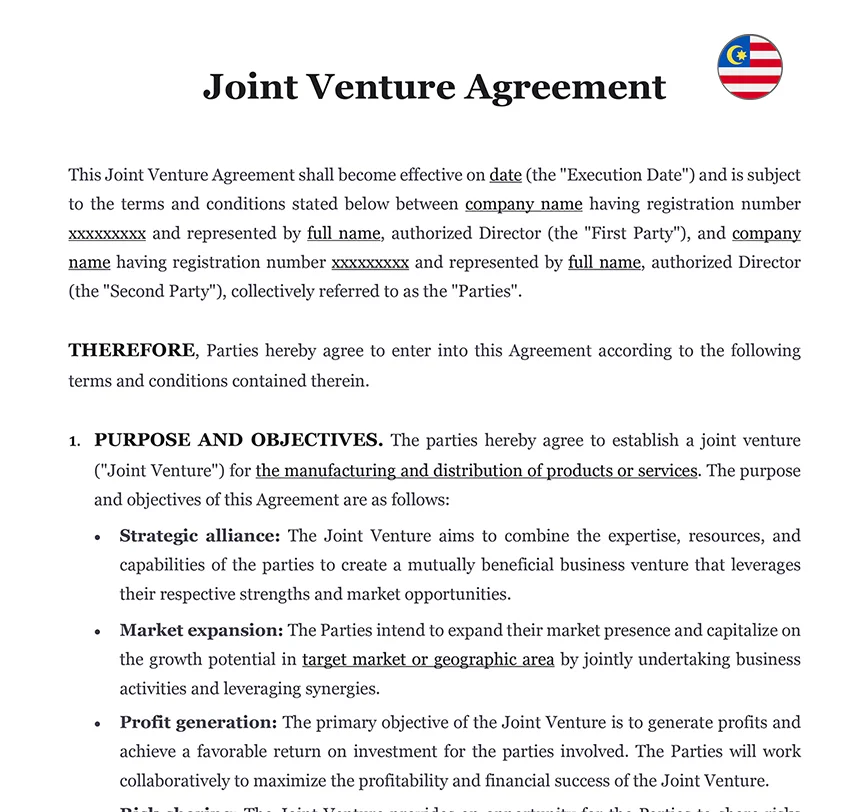Ready to use legal template
Drafted by experienced lawyers
Compliant with Malaysian law
Ready to use legal template
Drafted by lawyers
Compliant with Malaysian law
Home › Business contracts › Joint Venture Agreement
Learn more about Joint Venture Agreement in Malaysia
A Joint Venture Agreement refers to a contractual arrangement between two or more independent entities, typically businesses, to form a temporary or long-term partnership for a specific project or purpose. It establishes the framework for collaboration, defining the roles, responsibilities, contributions, and obligations of each party involved. The agreement outlines crucial details such as the distribution of profits and losses, decision-making processes, intellectual property rights, termination conditions, and dispute resolution mechanisms. Themis Partner offers you an easy to edit Joint Venture Agreement drafted by lawyers to comply with the law in Malaysia.
Table of contents
-
What is a Joint Venture Agreement?
-
Why use a Joint Venture Agreement?
-
What should a Joint Venture Agreement include?
-
How is it different from other Business Collaboration?
-
How are intellectual property rights protected with it?
-
What if I don’t have a Joint Venture Agreement?
-
How does it comply with legal requirements?
What is a Joint Venture Agreement?
A Joint Venture Agreement is a legally binding contract between two or more independent entities, typically businesses, that establishes a collaborative partnership for a specific project or purpose. It serves as a comprehensive framework that outlines the terms, conditions, and responsibilities of each participating party. The agreement covers crucial aspects such as profit sharing, decision-making processes, intellectual property rights, termination conditions, and dispute resolution mechanisms. By defining these parameters, it provides clarity, ensures transparency, and protects the interests of all parties involved. It enables companies to combine their resources, expertise, and market presence to achieve shared goals while maintaining their separate identities.
Why use a Joint Venture Agreement?
This Agreement is employed as a strategic business tool for various reasons. Firstly, it allows companies to access new markets, technologies, or expertise by leveraging the resources and capabilities of their partners. This collaborative approach enables companies to share risks and costs associated with a particular project or venture, making it more feasible and financially viable. Additionally, it can expedite business growth and expansion by combining complementary strengths, knowledge, and networks of the participating parties. It also enables companies to enter into new industries or geographical regions where they may lack local knowledge or market access. Moreover, the Agreement can facilitate innovation through the exchange of ideas and the synergy created by diverse perspectives. Overall, utilising a Joint Venture Agreement provides companies with an opportunity to achieve mutual benefits, foster strategic alliances, and pursue shared objectives in a structured and legally protected manner.
What should a Joint Venture Agreement include?
1. Purpose and Objectives
Clearly define the purpose and objectives of the joint venture, outlining the specific project or venture that the parties are collaborating on.
2. Contributions and Responsibilities
Specify the contributions, resources, and responsibilities of each party involved, including financial investments, assets, intellectual property, and personnel.
3. Governance and Decision-making
Outline the governance structure of the joint venture, including the appointment of board members or representatives, decision-making processes, and voting rights.
4. Profit Sharing and Financial Arrangements
Determine how profits and losses will be shared among the parties, including the allocation of expenses, revenues, and distribution of dividends.
5. Intellectual Property Rights
Address the ownership, use, and protection of intellectual property created or utilised during the joint venture, including any licensing or royalty arrangements.
6. Term and Termination
Define the duration of the joint venture and the conditions under which it may be terminated, including exit strategies, dissolution procedures, and dispute resolution mechanisms.
7. Confidentiality and Non-Competition
Establish provisions to safeguard confidential information and prevent participating parties from engaging in similar or competing activities outside the scope of the joint venture.
8. Performance Evaluation and Reporting
Specify the methods and frequency of performance evaluation, reporting requirements, and mechanisms for resolving disputes or addressing underperformance.
9. Risk Allocation and Liabilities
Address the allocation of risks, liabilities, and insurance coverage among the parties, including indemnification clauses and limitations of liability.
10. Governing Law and Jurisdiction
Determine the governing law and jurisdiction under which the agreement will be interpreted and enforced.
How is it different from other Business Collaboration?
The Agreement differs from other forms of business collaboration, such as a Shareholders Agreement or Partnership Agreement, in several key aspects. While a shareholders agreement primarily governs the relationship and rights of shareholders within a company, a joint venture agreement is focused on a specific collaborative project or venture between independent entities. Similarly, a partnership agreement establishes the terms and conditions of a partnership between two or more individuals or entities, but it typically involves a broader and ongoing business relationship. In contrast, a joint venture agreement is typically time-limited and formed for a specific purpose, allowing participating entities to maintain their individual identities and legal structures. Joint ventures often involve shared ownership and decision-making, but unlike a partnership agreement, they offer more flexibility and the opportunity for participants to collaborate without fully merging their operations or organizations.
How are intellectual property rights protected with it?
Intellectual property rights are crucial and protected within an Agreement through various mechanisms. Firstly, the agreement should clearly define the ownership and usage rights of intellectual property created or utilised during the joint venture. It should specify whether existing intellectual property brought into the venture remains the property of the respective parties or is shared jointly. Additionally, the agreement should address the protection of confidential information and trade secrets, outlining measures for maintaining confidentiality and preventing unauthorised disclosure or use. The agreement may include provisions for licensing intellectual property between the parties, specifying the scope, duration, and conditions of such licenses. Furthermore, mechanisms for resolving disputes related to intellectual property infringement or misappropriation should be outlined in the agreement.
These provisions collectively ensure that the parties’ intellectual property rights are acknowledged, protected, and appropriately utilised within the joint venture.
What if I don’t have a Joint Venture Agreement?
Not having the Agreement can lead to various challenges and risks.
| ➤ Without a clear and comprehensive agreement in place, the participating parties may face uncertainties regarding their roles, responsibilities, and the division of profits and losses. |
| ➤ Disputes may arise over ownership of intellectual property, decision-making processes, or the handling of confidential information. |
| ➤ It can also result in difficulties in terminating or exiting the joint venture, potentially leading to protracted legal battles and financial losses. |
| ➤ Moreover, without a formal agreement, there may be no provisions for addressing potential risks, liabilities, or dispute resolution mechanisms, leaving the parties vulnerable to unexpected situations. |




